|
Nuremberg TrialsWhen asked to name the "trial of the century," the post-literate, B-list-celebrity-obsessed, TV-anchor-as-Oracular-voice Generation X-Minus-One will almost invariably come up with the acquittal of O.J. Simpson as the scholarly height of bootylicious jurisprudence.But for sheer carnage (not to mention actual historical relevance), nothing beats Nuremberg. After World War II, the Allies found themselves uncomfortably confronted with an awful truth they had tried studiously to ignore even as the war was in full heat. This was the Holocaust.
What they ended up doing, of course, was the Nuremberg tribunal, an indictment of 24 of the most egregious offenders they had managed to catch, and six organizations that supported the Holocaust in various ways. There were three major charges levied during the Nurermberg tribunals: Crimes against peace (i.e., waging a "war of aggression"), war crimes and crimes against humanity. The first charge was problematic in a number of ways, although the easiest to prove. For one thing, it was predicated on international agreements that were worded in persnickety ways. For another, well, it's not like the Nazis were the first people ever to wage a war of aggression. The latter two charges had legs, however. The charge of "war crimes" related to atrocities performed by the Nazis in relation to the prosecution of the war itself. This included "murder, ill-treatment or deportation to slave labor or for any other purpose of civilian population of or in occupied territory, murder or ill-treatment of prisoners of war or persons on the seas, killing of hostages, plunder of public or private property, wanton destruction of cities, towns or villages, or devastation not justified by military necessity."
A broad range of individuals and institutions were subject to prosecution under these guidelines, although the number of actual people tried, convicted and sentenced was relatively small (compare to the estimated 6 million Jews and millions more Allied soldiers killed during the course of the Nazi regime). The individual defendants included Hermann Goering, Rudolf Hess and Albert Speer, Hitler's war minister, along with most of the governors of occupied territories and several propaganda and economic support personnel. The President of the Reichsbank was indicted, as well as Julius Streicher, one of Hitler's chief propagandists; Baldur von Schirach, head of the Hitler Youth; and Karl Doenitz, who led the Third Reich during the approximately five-minute interval between Hitler's death and the end of the Third Reich. During his trial, Goering, who had been chief of the German Air Force and a key player behind the Holocaust, casually dismissed the concentration camps as "protective custody," denied that the S.S. had ever been ordered to kill anyone (that was the Gestapo's job, he explained), and quibbled with prosecutors over whether he had called for a "total" or "final" solution to the "Jewish problem." Despite the leverage he could have extracted from a death-bunker statement in Hitler's will accusing him of disloyalty and attempting to secretly negotiate an end to the war, Goering also proclaimed his enduring loyalty to der Fuhrer. He was eventually sentenced to hang, but he committed suicide before the sentence was carried out. His peers fared little better. The president of the Reischsbank was sentenced to life in prison, and most of the military governors were sentenced to life or death by hanging. Hess received life in prison, where he committed suicide. Martin Bormann was convicted in absentia, but was later determined to be already dead. SS General Otto Olendorf wasn't considered "important" enough to be prosecuted during the first round of war crimes tribunals, despite the fact that he testified to personally ordering the execution of more than 90,000 Jews. Under questioning from prosecutor Col. John Amen, Olendorf's testimony summed up the worst qualities of many of the defendants, an incredibly detached attitude toward the Reich's program of genocide, consistently showing more regret for the workplace stress endured by the executioners than for the victims of said executions:
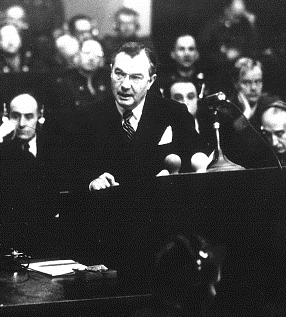 In his closing remarks, U.S. prosecutor Robert Jackson summed up the responsibilities of Hitler's minions in a historic speech. "I admit that Hitler was the chief villain. But for the defendants to put all blame on him is neither manly nor true. We know that even the head of the state has the same limits to his senses and to the hours of his days as do lesser men. He must rely on others to be his eyes and ears as to most that goes on in a great empire. Other legs must run his errands; other hands must execute his plans. On whom did Hitler rely for such things more than upon these men in the dock?"
In his closing remarks, U.S. prosecutor Robert Jackson summed up the responsibilities of Hitler's minions in a historic speech. "I admit that Hitler was the chief villain. But for the defendants to put all blame on him is neither manly nor true. We know that even the head of the state has the same limits to his senses and to the hours of his days as do lesser men. He must rely on others to be his eyes and ears as to most that goes on in a great empire. Other legs must run his errands; other hands must execute his plans. On whom did Hitler rely for such things more than upon these men in the dock?"In the end, suicide, escapes and the casualties of war allowed the worst offenders of the Nazi regime to escape the direct hand of Justice, and somehow death by hanging doesn't quite seem to measure up to lampshades made of human skin. But Nuremberg did result in some convictions. And the tribunals united the international community against the horrors of genocide and unchecked fascism (at least momentarily). And that's a lot more important than O.J., as trials of the century go...
Timeline
|
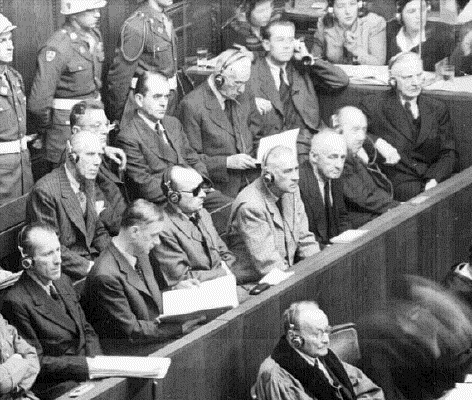
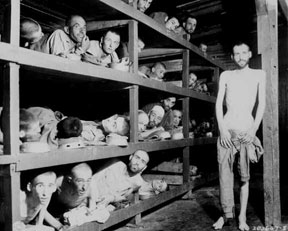 You would think, especially when hearing
You would think, especially when hearing 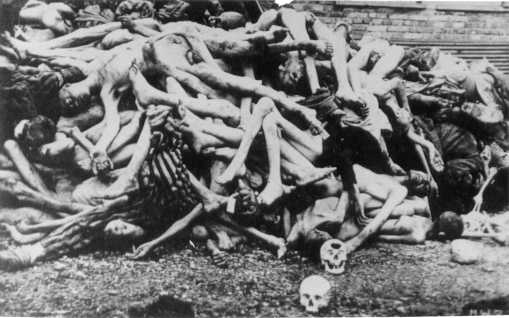 Crimes against humanity were defined in the Nuremberg charter as "murder, extermination, enslavement, deportation, and other inhumane acts committed against any civilian population, before or during the war; or persecutions on political, racial or religious grounds in execution of or in connection with any crime within the jurisdiction of the Tribunal, whether or not in violation of the domestic law of the country where perpetrated."
Crimes against humanity were defined in the Nuremberg charter as "murder, extermination, enslavement, deportation, and other inhumane acts committed against any civilian population, before or during the war; or persecutions on political, racial or religious grounds in execution of or in connection with any crime within the jurisdiction of the Tribunal, whether or not in violation of the domestic law of the country where perpetrated."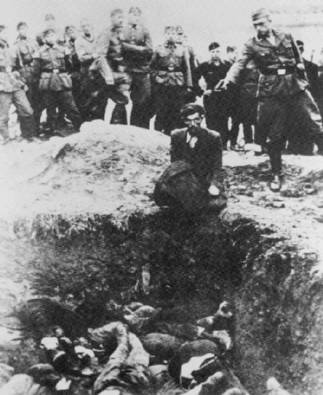 COL. AMEN: What were (the S.S. officers') instructions with respect to the Jews and the Communist functionaries?
COL. AMEN: What were (the S.S. officers') instructions with respect to the Jews and the Communist functionaries?